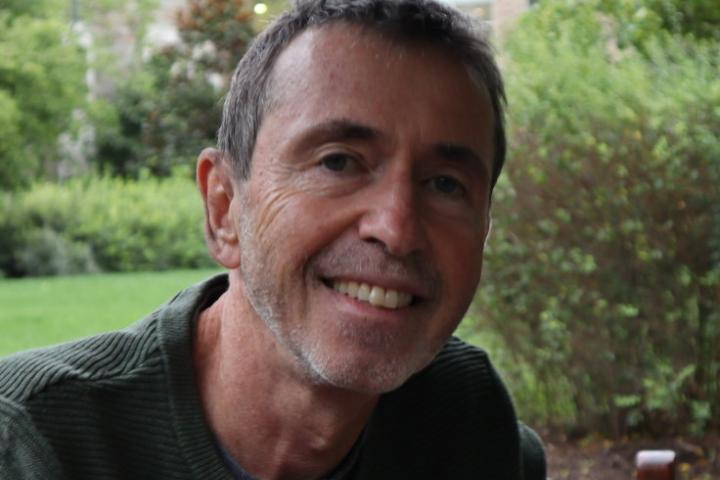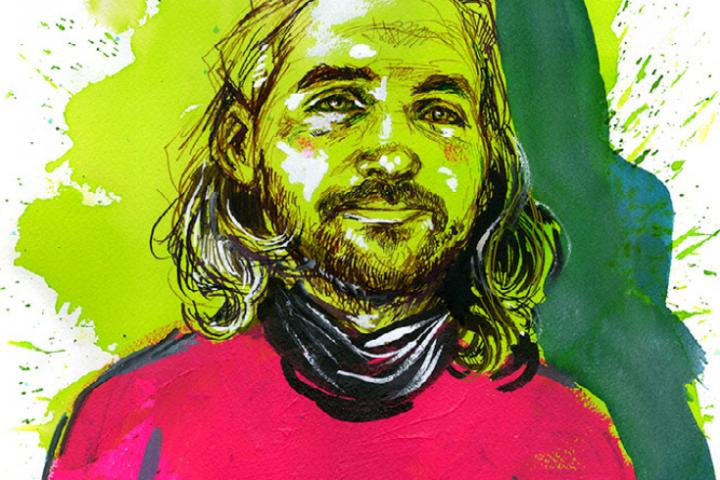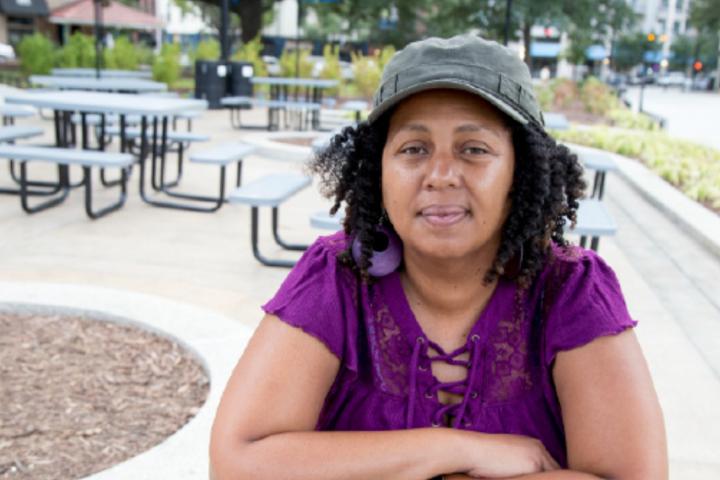Interview with Nicanora Montenegro, a home care provider in California
Interview conducted on May 4th, 2020
Introduction:
Nicanora Montenegro is a home care provider in San Diego, California. She takes care of her developmentally challenged sister. She began working in the field in 2004, caring for her physically disabled mother until she passed away in 2014. The COVID-19 pandemic forced her sister’s adult day program to close and she now cares for her sister full-time, despite receiving no increased pay. She is Vice President of UDW-AFSCME 3930 District 1 and believes that home care providers should be considered as essential, front line workers.
Full transcription:
Johnnie Kallas: Where do you work and how long have you worked in your field?
Nicanora Montenegro: I started taking care of my mom, who was physically disabled, and my sister, who is developmentally challenged, in 2004. It was approved under the In-Home Supportive Services Program in August 2004 and automatically I became a member of our union, the United Domestic Workers of America. I started being active with the union in 2005 as I learned more about the union. What really made me decide to join the union is that when I was asking what the union is all about, they let me join an organizer and we started door knocking and visiting other home care providers. That was a big eye-opening for me to knock on provider’s homes because it is true that I saw the reality, and my heart really bled when I saw the conditions, situations, and the concerns of providers. I saw communication barriers, education barriers, and cultural barriers. But most of all, we work individually at home. We do not have a common workplace. There are 20,000-25,000 in-home providers in San Diego alone. That means more than 20,000 houses which are actually our workplace. That is another barrier. But realizing the difficult piece that most of the providers had been experiencing really made my heart bleed. I decided that someone should be able to speak for them. So I joined the union actively where I became first a member of the board for the San Diego unit and later became secretary-treasurer which transformed into recording secretary. Recently, I was elected by our members to become the district chair for San Diego.
J: Can you describe the nature of your work and what you do on a daily basis?
N: On a daily basis I took care of my mom who was physically disabled and my sister who is developmentally challenged. I bathe and help them in the morning. I prepare all of their food for them. I go out and shop and buy groceries. I clean the house. I take them to doctor appointments. You are just like a nurse and make sure they take their medication on time. I did the blood and glucose testing twice/day for each one of them and gave them medication. When we go to the doctor, I need to make sure I am there so I know the instructions and different procedures for both of them. When my mom’s kidney started failing I had to be trained to do dialysis. My mom’s heart cannot handle the dialysis machine. She cannot even handle the peritoneal dialysis machine. So I have to do the dialysis on her manually. I got just two hours of sleep each day. I do manually the dialysis at midnight, 6 am, noon, 6 pm every day. We cannot afford to miss a day because if that happens there will be pollution in her body and she gets sick.
J: So do you take care of both your mother and your sister?
N: My schedule was dialysis 6 am-8 am. After that, I clean the house and bathe my sister and prepare breakfast. Then, I take my sister to the adult program. I go back to my mom and give her a bath. I need to sanitize the room, change the beddings in preparation for 12 pm when I prepare lunch for her. I then try to take her out to get a little sunshine. After that, I get her back. Usually, I do the dialysis on her before she takes her lunch. Do the dialysis again from 12 pm-2 pm. After that, I give her lunch. After that, I run and pick up my sister. I get some groceries if possible or take them to the doctor if they have appointments. I need to get back before 6 pm for the dialysis. Then after providing and preparing dinner then I have to prepare for dialysis at midnight. I need to put her to sleep for a while so I can wake her up at midnight. Meanwhile, I also prepare the food, checking of medication, and materials that my mom needs. Doing the dialysis, it all depends upon her blood pressure and giving her the medication. You could imagine that my sleep window is only 3 am-5 am. Only time I can sleep for longer than a little while. Because of my mom’s roller-coaster blood pressure, I had to do first aid on her. How can I get out and get a job outside if I leave my mom and my sister?
JK: That is very incredible that you are able to do that. How has the coronavirus pandemic impacted your work?
N: When my mom passed away in 2014, I was able to sleep more. I now have a little bit more time. It’s my sister that I am taking care of. I really cannot get a full-time job while taking care of her. I cannot tell my employer that I need to bring my sister to the doctor and miss work. She also has temper tantrums. I have to go to the daycare day program and pick her up. It is difficult to have a regular full-time job. I really have to just take care of her and do a little job here and there.
The coronavirus has impacted me so much. First, when the day program for my sister closed, it’s the only rest I have and time I can do some work for about 5 hours per day. I take her in the morning and then do some work, volunteer and work with the union, and then bring her home at 3 pm. After that, I need to be with her. I have to bring her if there are things I need to do. With the coronavirus, the program closed. So that means I really cannot do much now. I have to be with her all of the time. She has more temper tantrums now. She was good when she had programs and activities, but now she has more temper tantrums and I have to see what she is doing all of the time. It’s giving me a lot of stress, not more rest.
JK: I didn’t realize your mom passed away in 2014. I am sorry about that. Are you getting compensated for the extra work?
N: No. I am only compensated for four hours/day. That’s the only compensation I get from the in-home support service. I even have to fight for those hours. I had to go through an appeals process before she was given four service hours. Of course, I need to take care of her for more than four hours/day. How do you think I survive with that kind of money? That’s not even enough to pay for utility bills. That’s why providers like me need to have other jobs. In between caring, we need to at least have other jobs that are not permanent, but that provide income or we cannot survive.
JK: What are you and the union doing to advocate for home care providers during this crisis?
N: Our union has worked so hard even without COVID. There are many issues. First, we were not really given minimum wage. Aside from the fact that we are only given a few hours/day, we were not given the minimum wage. But our union had fought for that. At least we are now at the California state minimum wage. One victory by our union. Second, the state wanted to reduce the hours by 20%. Our union fought so that did not come true. They still removed 8% and we kept on fighting until it finally became 7%. Again, there is an attack that says it will be given back because of the budgetary crisis. It will jeopardize not only the providers but also the clients because of the reduced hours. We never had any vacation time, sick time, or overtime. But our union was able to see at least those with more hours will have overtime pay. The union won that. Our union also won sick time, but we are only allowed 8 hours/year. It’s ridiculous. That’s what the government gave. The union is fighting really hard for us to have more hours. Now with COVID, we fought. Our director wrote letters and our communication department wrote letters to Governor Newsome to ensure that we are given protection. For example, this is really the dilemma I have in my heart. In-home support services work is actually a job, an occupation. But it seems that it was never treated that way. Senate Bill 1257 excluded domestic workers. We need that, it’s occupation health and safety. When I was first interviewed about this in early-March, the first thing I said is that I salute the frontliners like the doctors, nurses, but they should consider caregivers and in-home support services as front liners too. They seem to have forgotten us and left us out. They never considered giving us the PPE. But not only the PPE, there is no hazard pay. But we take care of the disabled members of the community to ensure they are protected by Covid-19 and make sure we are protected as well. Home care providers need to go home to family after caring. We need to help them. We need to be considered not only essential workers, but also considered as frontliners, but we were left behind.
What did our union do? When Covid-19 came, our executive director wrote to Governor Newsome and the government changed their policy. They are supposed to be giving out PPE and the union is helping distribute that. But even before the PPE came, our union, with our limited income, tried to purchase PPE like face-masks, sanitizer, and gloves. Even if it’s just a small amount for two weeks, at least we started distributing to our members. We told our members to come and pick up through a drive-through. Our union also held a meeting for us about Covid-19 and how to protect ourselves in terms of occupational safety. Even if we are not included in the occupational safety bill, our union tried to ensure that we know how to hand wash and how to protect ourselves. Our union has also been distributing food once/month in the past to the community and to our members, but we changed it to at least twice/month. We are also connected with our Central Labor Council to distribute more food. That’s what our union is trying to do.
JK: It sounds like your union has made a big difference. Is there a big disparity between union and nonunion protections?
I am also a member of the Pilipino Worker Center and this organization is trying to reach out to all of those caregivers who do not belong to the union and how they can be helped and assisted. Small provisions are not really enough and there are a lot of issues out there. Our issue is not only the PPE but the service hours given to the client. We have many providers who are caring for developmentally challenged people and elderly who go to adult programs and school. Since schools and adult programs are closed, they have to take care of the clients without additional hours. I don’t know why the politicians cannot understand that. Because of our letter and concern about the sick leave, they issued a memorandum saying we can have at least two weeks of sick leave for the first time, but only COVID related. But it does not help providers who get sick that is not COVID related and still only get 8 hours for the full year. We have no vacation or retirement pay. We are front liners and essential workers but we are not regarded that way. Yes, we have been invisible people because our legislators do not see our importance, significance, and contribution to society. The in-home supportive service is the cheapest way by which we can take care of the disabled members of our community. It’s the cheapest way. If you take all of the disabled people to an institution how much would the government spend on each one? And they are spending too small of an amount for providers and yet we are not regarded with respect and dignity.
I want our legislatures and the public to understand that we are not only essential workers, but we are front liners. They should start seeing us and considering our work as an occupation given the respect, dignity, and benefits as an occupation. This work is a job where we support our family as well. This is a job, they should not consider it as nothing.



